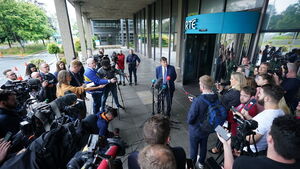Sharp practices are still part of Irish psyche

RTÉ director general Kevin Bakhurst speaks to the media outside the broadcaster's headquarters in Donnybrook, Dublin, at the height of the payments controversy last July. Picture: Niall Carson/PA Wire
There’s a story told (and it’s true) about a visit the late Cardinal Conway paid to Enniscrone Golf Club many years ago. An avid golfer, Conway was accompanied by his classmates, Bishops Tommy McDonnell and Paddy Mulligan.
At one point they took shelter from the rain in what was then a very basic corrugated tin hut. Soon they were joined by three other golfers, among them a local district justice.
The conversation was a bit forced until it was disrupted by a rumble of thunder in the distance. A worried silence ensued until the district justice, speaking quietly to his fellow golfers but well within ear-shot of the three bishops suggested that, even if lightening did hit the hut, looking at the bright side, he suggested, 'we’d have a good chance of getting to Heaven in the rush'.
That phrase, 'in the rush', sums up a definitively Irish way of exploiting even the least promising of situations to one’s own advantage. At its worst, we saw it recently when a vicious stabbing followed by riots in Parnell St, Dublin were exploited by a mob who took advantage of the mayhem and stole ‘free’ booty from shops.
The same philosophy of exploitation to one’s own advantage was apparent in the fall-out from the recent RTÉ payments scandal when it emerged that part of the collateral damage of that fiasco was a short-fall of €32 million in unpaid television licenses as an estimated 200,000 decided not to pay their €160 television licence. It might be concluded that the license-payers in 200,000 homes were so enraged that the soft-touch RTÉ approach to financial management had devastated its reputation as a respected and authoritative public service broadcaster – and not paying the license was a form of protest.
Very few would buy that conclusion. As the huge gap between those who never pay their TV licenses and the 200,000 figure became apparent, it was clear that the decision not to pay the license was motivated less by upset at the RTÉ crisis over hidden payments to ‘star’ presenters and more by the ‘safety-in-numbers’ opportunity it presented as a handy excuse not to pay.
In the hundreds of acres of newsprint coverage of the RTÉ payments scandal, including the probable fall-out for the taxpayer of making up the €32 million deficit because of the non-payment of television licenses, there has been (to my knowledge) no comment on the rush of thousands and thousands of television viewers to avoid paying their licenses. And no comment as to their obligation to still meet their legal obligations. Or, if they decline, what action will be taken to pursue them – as the list is readily available to the authorities.
What is involved here is people refusing to pay for a service they voluntarily choose and, effectively, accepted the attached fee which as compliant citizens they now have a moral responsibility to meet.
But is it fair to say that? What about those who genuinely felt aggrieved by the intrigues and deceptions in RTÉ and decided to protest by withholding their license fee? There may indeed be people in that category but the test of whether their protest was genuine depends on what they did with the €160. If they decided to give it to the Vincent de Paul or another charity in lieu of the fact that it wasn’t really their own money, then they’re genuine. If the €160 is, as Fr Ted Crilly used to say, still ‘resting in their account’, no, they’re not genuine because it’s not their own money.
This swashbuckling approach – by which we Irish are so often tempted to augment our financial well-being at others’ expense – generates a cowboy mentality whereby a set of ‘alternative’ working principles are presented as acceptable and effective: never pay a bill if you can avoid it; grease the palms of decision-makers (bribe); make things up to suit yourself as you go along; blame the government as anti-progressive for regulating standards; evade paying tax, if you can possibly avoid it; and do whatever suits yourself in the circumstances.
Topical examples of this creative alternative abound. Or what might be described as ‘sharp practices’. Take planning permissions – and the practice of extending, say, agreed boundaries of a planning permission and, after building, then later applying for retention. It appears that thousands of applications for retention have been almost ritually accepted and few if any who abused the system have had to demolish illegal extensions.
Estates have been built where developers have treated planning permissions as mere suggestions from the authorities, in some instances squeezing extra houses in a site beyond the number specified. Or using exemptions relative to agricultural development that don’t require planning permission for other hidden purposes.
And then there are the serial objectors to planning permissions happy to withdraw their objections for a bounty and whose activities have been vividly exposed recently on RTÉ television with objectors happy to shed all their reservations once those waiting for planning permissions have made an acceptable financial donation – and it’s not to the Vincent de Paul!
Another scam is the ongoing refusal to pay taxes owed to the people of Ireland which the Revenue Commissioners are charged with the responsibility of collecting on behalf of the State. During Covid, the Revenue – aware of the significant stresses and strains that business had to endure as businesses came under huge pressure to the point of collapse – pulled back from their usual no-nonsense approach but are now warning that €3.2 billion in tax debts are due at the end of 2023, including from 58,000 Covid-related taxpayers. Enforcement activity was suspended over the last four years but, it now seems, that Revenue is losing patience and that unless arrangements are made by next May to clear outstanding debts more robust enforcement will ensue.
Time to surround the cowboys.





